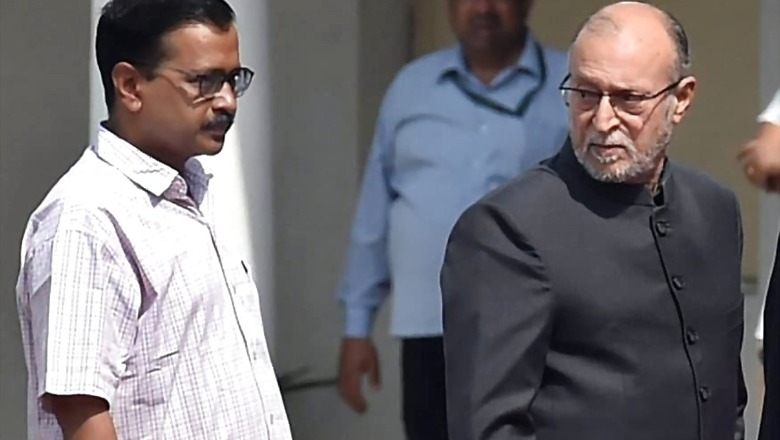
views
The Aam Aadmi Party (AAP) should celebrate the Supreme Court Wednesday’s order as a major political victory with a pinch of salt. Though the judgment in spirit may be seen to be backing the elected government it has done little in words to add to the powers of the city’s political executive. There are three major points to ponder over, which in essence will not allow any material change in the relationship between Delhi Secretariat and the Raj Niwas. These are:
A) The Supreme Court has upheld its earlier nine-judge bench judgment which ruled out full-statehood for Delhi.
B) It has not enhanced the limited powers of legislation of Delhi Assembly.
C) The Supreme Court has not set aside the Delhi High Court order which had upheld the MHA notification of May 21, 2015.
Delivering the majority judgment in the matter, Chief Justice Dipak Misra said, “Delhi can't have powers of a full state in view of an earlier nine-judge judgment.”
In his separate but concurring judgment, Justice DY Chandrachud said, “The real power must lie in the elected representatives in a democracy. They owe responsibility to the legislature. But balance has to be struck considering the special status of the Delhi and fundamental concerns as Delhi is the National Capital.” With statehood ruled out and special status of Delhi upheld as the national capital, the order rather deflates AAP’s recently launched political campaign for full statehood for Delhi.
The next point which needs to be examined is - has the Supreme Court in any way added to the law making powers of the Delhi Assembly? The majority judgment delivered in the matter on Wednesday said, “The executive powers of the legislative Assembly co-exists with its legislative powers. The Union Government has exclusive power over land, police and public order. Some required degree of independence has to be given to Delhi Government. Lieutenant Governor Anil Baijal is bound by act and advice of the council of ministers. Lieutenant Governor Anil Baijal can't act independently unless Constitution allows.”
As per the prevailing circumstances the Delhi Assembly cannot make law on matters under the Union List and also on matters of law and order and land from the state list. Under this arrangement, the National Capital Territory Act makes the Lieutenant Governor Head of the Delhi Police and the Delhi Development Authority.
The Wednesday’s order doesn’t seek to alter this arrangement. To be more precise, the latest apex court order even cannot be used by the Delhi Government to get under its control the Anti-Corruption Branch, which remains part of Delhi Police though at some point of time in the 1990s the Lieutenant Governor had delegated its superintendence to the Chief Minister.
The Supreme Court order is also silent on the fact that in the law making process, all the bills that have a financial implication have to be cleared by the MHA before being passed by the Delhi cabinet and subsequently tabled in Delhi Assembly. Such bills would continue to follow the same route as the Supreme Court has not rejected the MHA notification of May 21, 2015. It even doesn’t criticise the Delhi High Court order which upheld this notification.
Justice Ashok Bhushan, in his separate but concurring judgment, said, “We are, thus, of the view that the 1991 Act and 1993 Rules cover the entire gamut, manner and procedure of executive decisions taken by the Council of Ministers/Minister their communication (to L-G), and implementation and the entire administration is to be run accordingly. The 1993 Rules provide that Chief Secretary and the Secretary of the Department concerned are severally responsible for the careful observance of these Rules and when either of them considers that there has been any material departure, he shall bring it to the notice of the Minister-in-charge, Chief Minister and the L-G.”
The essence of the Wednesday’s judgment is that the Supreme Court judges have counseled the Lieutenant Governor and the Council of Ministers to work in harmony rather than at cross-purposes.
Justice Ashok Bhushan in his judgment said, “The duty of observance of 1993 Rules and other statutory provisions lay both on Council of Ministers, Chief Minister and L-G. All have to act in a manner so that the administration may run smoothly without there being any bottleneck. The object and purpose of all constitutional provisions, Parliamentary enactments and the Rules framed by the President is to carry the administration in accordance with the provisions in the interest of public in general so that rights guaranteed by the Constitution to each and every person are realised. When the duty is entrusted on persons holding high office, it is expected that they shall conduct themselves, in faithful, discharge of their duties to ensure smooth running of administration and protection of rights of all concerned.”
The judges probably perceived the political fallout of the order and the Chief Justice while delivering his order rightly said, “No authority should feel it has been lionised... Mutual respect is the key.”
(The writer is a senior journalist and political commentator. Views expressed are personal)


















Comments
0 comment